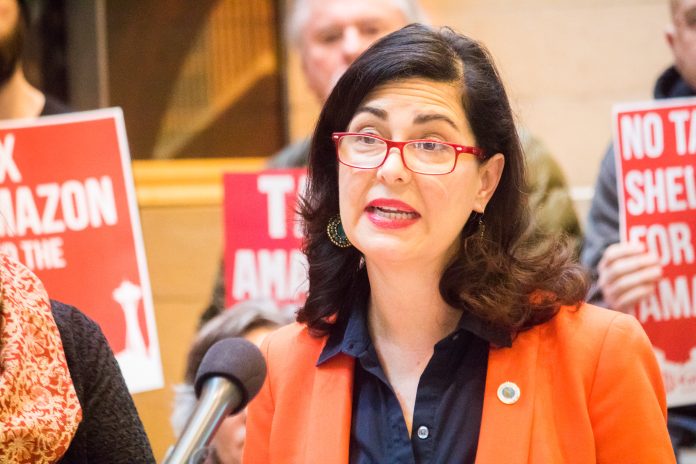
This morning, Tammy Morales announced she is running for a second term on Seattle City Council, becoming just the second of seven councilmembers up for election to officially do so. From the steps of El Centro de la Raza in Beacon Hill, she laid out her accomplishments, goals for her second term, and optimism for the city.
Four councilmembers — Lisa Herbold, Debora Juarez, Alex Pedersen, and Kshama Sawant — have announced plans to leave the council at year’s end instead of seeking another term. Councilmember Andrew Lewis (District 7) announced his reelection bid on January 17. Councilmember Dan Strauss (District 6) hasn’t announced plans yet, but appears to be preparing for reelection.
“City politics is a tough job. In this city, at this moment, it’s maybe as tough as it’s ever been, and I don’t begrudge my colleagues for choosing not to run again,” Morales said in her remarks. “But for me, that isn’t a reason to give in. We have a chance to build healthy, resilient neighborhoods; to manage our city’s growth so that our kids, our elders, our neighbors can thrive. Despite the increasing chorus cynicism, I’m still hopeful for that kind of future,” said Morales. “So let’s get to work.”
Representing diverse and left-leaning District 2, Morales has been a stalwart on the council’s progressive wing during her first term, and she launches her reelection bid with an array of progressive endorsements, including Congresswoman Pramila Jayapal, former Seattle City Council President Lorena González, State Sen. Rebecca Saldaña, Rep. Liz Berry, Seattle City Councilmember Teresa Mosqueda, King County Councilmember Girmay Zahilay, and former King County Councilmember Larry Gossett.
“Councilmember Tammy Morales is a progressive champion on the Seattle City Council who always fights for a stronger, more equitable Seattle,” Jayapal said in a statement. “She has been a strong partner to me on ensuring that government works for everyone, not just the wealthy and well-connected, and she always ensures that the voices of people of color, poor people and working people come first.”
During her announcement, Morales was joined by supporters including El Centro de la Raza Housing and Economic Development Director Miguel Maestas, Puget Sound Sage Co-Executive Director Chrissy Shimizu, Tenants Union Executive Director Violet Lavatai, and Seattle Neighborhood Greenways Community Organizer Clara Cantor, all of whom were speaking for themselves rather than the nonprofits they work for, which haven’t endorsed.
“D2 is the most diverse district in the city, driving some of the most progressive policies in our region. Our district needs a champion for workers, housing, and the environment. We have that in Councilmember Morales,” Shimizu said. “Tammy and her team practice true co-governance, working with communities to create impactful policy change that is rooted in equity. Tammy has always been accountable to the community that elected her and continues to translate the needs of the community into real policy outcomes at City Hall.”
One role that Morales has been thrust into is advocating for safe streets and walking, rolling, biking infrastructure as Seattle has seen an uptick in traffic deaths despite its Vision Zero pledge to eliminate traffic deaths by 2030. Southeast Seattle has been the epicenter of this crisis, with more than half of the recent deaths happening in D2 alone. Meanwhile, transportation chair Alex Pedersen has at times sought to minimize the crisis and lacked concerted attention to the issue. Morales has filled the void and sought to keep safety projects in her district moving and focus on the issue.
Nonetheless, the Seattle Department of Transportation (SDOT) has delayed a number of long-planned protected key bike lane projects in South Seattle, pushing many to 2024. A recent $25.6 million federal grant could help jolt those projects and potentially accelerate timelines — or at least avert further delays.
During her press conference, several local journalists probed for weaknesses and gotcha months with question on defund the police and homeless camp removal policy. Morales, however, parried the pointed questions and stayed focused on her message of delivering for working class people in her district.
Morales has also been a strong advocate for social housing, and fought unsuccessfully for an amendment laying the groundwork for a public developer of social housing in Seattle, which is what Initiative 135 (currently on the ballot in a special election) would initiate. She has paired that call for more below-market housing with a call for greater zoned housing capacity in Seattle, and argued for an Alternative 6 to the Seattle Comprehensive Plan in an Seattle Times op-ed.
She has supported progressive revenue options including the progressive corporate payroll tax that funds the JumpStart Seattle program, which averted austerity cuts during the pandemic and will fund affordable housing and Green New Deal priorities for years to come.
Morales won election in November 2019 with more than 60% of the vote. The Urbanist Elections Committee endorsed her in 2015, when she narrowly lost to Bruce Harrell, and in 2019. Given her record, she appears likely to be a formidable opponent for those hoping to hop in the race.
Correction: Originally this article had stated Councilmember Andrew Lewis hadn’t announced reelection plans, but he had done so on January 17th, ahead of Morales.
Doug Trumm is publisher of The Urbanist. An Urbanist writer since 2015, he dreams of pedestrian streets, bus lanes, and a mass-timber building spree to end our housing crisis. He graduated from the Evans School of Public Policy and Governance at the University of Washington in 2019. He lives in Seattle's Fremont neighborhood and loves to explore the city by foot and by bike.

